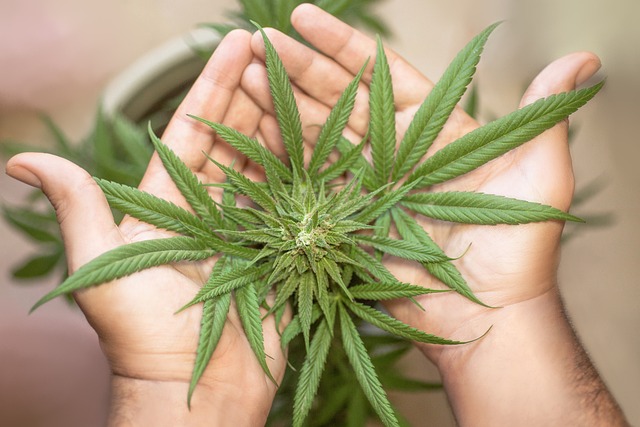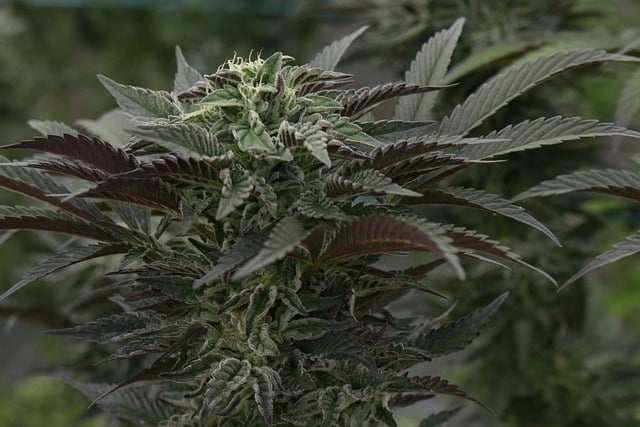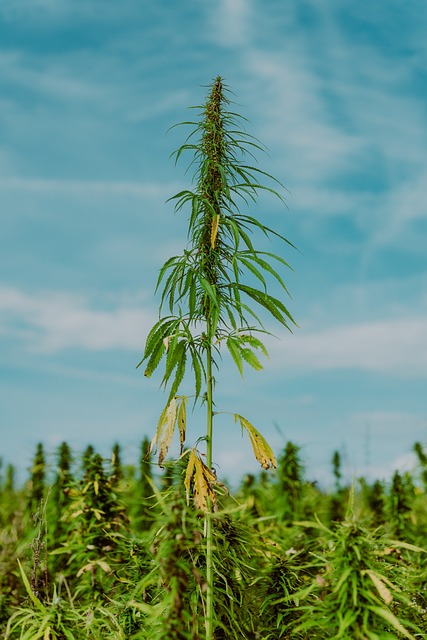THCA, or tetrahydrocannabinolic acid, is a non-psychoactive compound found in hemp and cannabis plants that can be converted into psychoactive THC with heat. As of the knowledge cutoff date, THCA products with less than 0.3% THC are legal under both federal and state regulations in Minnesota, including as per the 2018 Farm Bill. However, consumers must stay informed about evolving legal statuses. Consumption of THCA flower may lead to mild side effects like dry mouth and red eyes, with potential psychoactive effects if heated. Users might also experience drowsiness or heightened anxiety. It's recommended to start with a low dosage to gauge individual reactions. Minnesota's regulations on THCA are clear, with the compound being legal when derived from hemp containing trace amounts of THC. The state is at the forefront of cannabinoid regulation, facilitating research into THCA's potential health benefits and ensuring a safe and regulated environment for consumers. This legal clarity in Minnesota sets a standard for informed decision-making in the realm of cannabinoid use and public health policy.
Exploring the nuances of THCA flower and its side effects within Minnesota’s regulatory framework, this article sheds light on the emerging landscape of cannabinoid legality and health impacts. From navigating the legal status of THCA in Minnesota to understanding its influence on well-being, readers will gain insights into how this non-psychoactive compound is being regulated and its potential effects, ensuring a comprehensive overview for those curious about the therapeutic properties and legal considerations surrounding THCA.
- Navigating THCA Flower Side Effects and Legality in Minnesota
- Understanding the Impact of THCA on Health: A Focus on Minnesota's Regulations
Navigating THCA Flower Side Effects and Legality in Minnesota

Navigating THCA flower side effects requires a comprehensive understanding of its legal status and potential impacts on users, particularly in Minnesota. THCA, or tetrahydrocannabinolic acid, is a non-psychoactive cannabinoid found in raw cannabis plants, which, when heated, converts to the more well-known THC. In Minnesota, the legality of THCA flower has evolved over time. As of the knowledge cutoff date, hemp-derived THCA products containing less than 0.3% THC are legal under the 2018 Farm Bill and subsequent state legislation. However, it’s crucial for consumers to stay informed as state laws can change.
The side effects associated with THCA flower are generally mild compared to its psychoactive counterpart, THC. Common reported side effects include dry mouth, red eyes, and potential psychoactive effects if the product is later decarboxylated. Users may also experience drowsiness or increased anxiety. It’s important for individuals to start with a low dose to gauge their sensitivity and adjust accordingly. The legality of THCA in Minnesota adds another layer of consideration for users, as it’s essential to ensure that any products containing THCA comply with state regulations. Users should always purchase from reputable sources and understand the product’s origin and composition to avoid legal repercussions and ensure safety.
Understanding the Impact of THCA on Health: A Focus on Minnesota's Regulations

In recent years, there has been a growing interest in the potential health benefits and side effects of THCA, or tetrahydrocannabinolic acid, a non-psychoactive compound found in cannabis and hemp plants. As research continues to evolve, consumers and healthcare providers are increasingly seeking information on the implications of THCA consumption, especially in contexts where its use is regulated. Minnesota, for instance, has established clear regulations regarding the legal status of THCA. According to Minnesota’s laws, THCA is considered a legal compound when derived from hemp that contains less than 0.3% THC on a dry weight basis. This distinction is crucial as it differentiates THCA from its psychoactive counterpart, THC, which remains controlled under federal and state laws.
Understanding the impact of THCA on health within Minnesota’s regulated environment involves a careful examination of both anecdotal reports and scientific studies. While some early research suggests that THCA may offer potential therapeutic properties without the psychoactive effects associated with THC, it is essential to approach these findings with caution. Minnesota’s regulations ensure that consumers have access to products containing THCA while maintaining a framework for safe and legal use. These regulations also facilitate ongoing research into the compound’s efficacy and side effects, providing a foundation for informed decision-making by both users and policymakers. As such, the state’s approach to THCA legality reflects a commitment to public health and safety, aligning with broader national trends towards responsible cannabinoid regulation.
In conclusion, the exploration of THCA flower’s side effects and its legal status in Minnesota has highlighted the need for cautious consideration and adherence to state regulations. It is clear that while THCA may hold potential health benefits, understanding its effects is crucial for consumers. As outlined in this article, THCA’s legal standing in Minnesota offers a framework for safe usage, ensuring that individuals can access its potential benefits responsibly. For those interested in incorporating THCA flower into their wellness routine, it is imperative to stay informed on both the scientific and legal developments surrounding this cannabinoid. The information provided here underscores the importance of compliance with Minnesota’s regulations, which are designed to protect public health and safety while accommodating the growing interest in cannabis-derived products.
